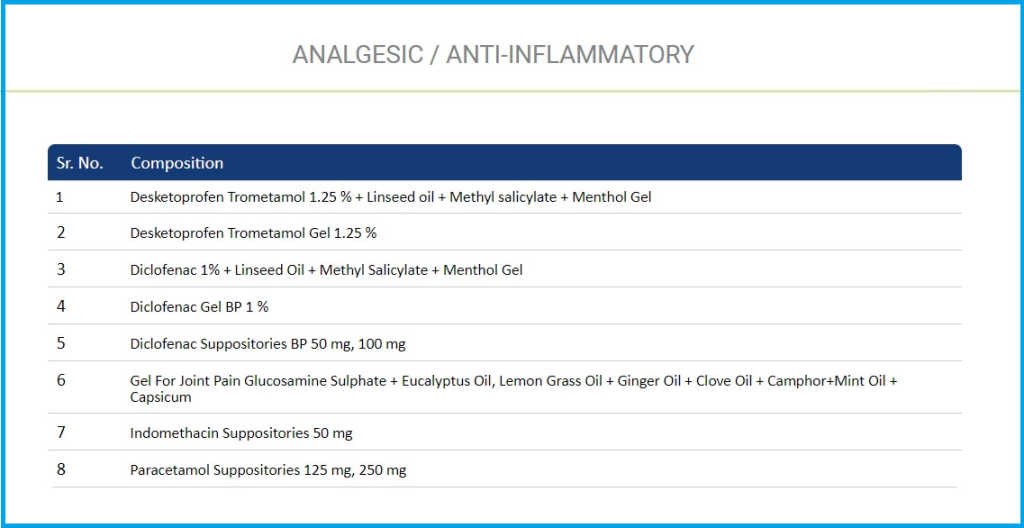Introduction:
Pain and inflammation are common conditions that affect millions of people worldwide. To alleviate these symptoms, analgesic anti-inflammatory creams have become a popular choice for topical pain relief. In this article, we will explore what anti-inflammatory analgesics are, their uses, mechanisms of action, common products, application methods, effectiveness, and potential risks associated with their use.
What is an anti-inflammatory analgesic?
An anti-inflammatory analgesic is a type of medication that combines both anti-inflammatory and analgesic (pain-relieving) properties. These substances work by reducing inflammation, which is the body’s natural response to injury or irritation, and by blocking pain signals to the brain. Analgesic anti-inflammatory creams are topical formulations designed for direct application to the skin, targeting localized pain and inflammation.
What are anti-inflammatory creams used for?
Anti-inflammatory creams are primarily used to alleviate pain and reduce inflammation in specific areas of the body. They are commonly employed to manage conditions such as arthritis, muscle strains, sprains, tendonitis, and other inflammatory disorders. These creams are particularly beneficial when treating superficial pain and inflammation, offering targeted relief without the need for systemic absorption.
How do anti-inflammatory creams work?
The active ingredients in anti-inflammatory creams typically include nonsteroidal anti-inflammatory drugs (NSAIDs) such as ibuprofen, diclofenac, or salicylates. These compounds inhibit the activity of enzymes called cyclooxygenases (COX), which are involved in the production of prostaglandins—a group of chemicals that promote inflammation, pain, and fever. By blocking these enzymes, anti-inflammatory creams help to reduce the synthesis of prostaglandins, leading to decreased pain and inflammation at the application site.
Common topical anti-inflammatory products:
Several over-the-counter and prescription anti-inflammatory creams are available in the market. Examples include:
- Voltaren Gel (diclofenac sodium)
- Bengay (menthol, camphor, methyl salicylate)
- Icy Hot (menthol, camphor)
- Aspercreme (trolamine salicylate)
- Biofreeze (menthol)
- Topricin (natural ingredients)
- NSAID patches (containing ibuprofen or diclofenac)
It’s crucial to choose a product based on the specific ingredients and the condition being treated, as different formulations may have varying levels of efficacy for different individuals.
How to apply anti-inflammatory creams:
To maximize the effectiveness of anti-inflammatory creams, it is important to follow proper application techniques:
- Clean the affected area before application.
- Apply a small amount of the cream to the affected area.
- Gently massage the cream into the skin until it is fully absorbed.
- Wash hands thoroughly after application to prevent accidental transfer to sensitive areas.
Always read and follow the instructions provided by the product’s manufacturer or your healthcare provider.
How effective are anti-inflammatory creams?
The effectiveness of anti-inflammatory creams varies depending on the individual and the specific condition being treated. These creams are generally more effective for localized pain and inflammation rather than widespread or systemic issues. Some people experience significant relief, while others may find only partial or temporary benefits. It is essential to consult with a healthcare professional to determine the most appropriate treatment plan for your specific situation.
Are there any risks or side effects to be aware of?
While topical anti-inflammatory creams are generally considered safe when used as directed, there are potential risks and side effects to be aware of:
- Skin irritation: Some individuals may experience skin redness, itching, or a rash at the application site.
- Allergic reactions: Allergic responses to specific ingredients in the cream can occur, leading to more severe skin reactions.
- Systemic absorption: Although the risk is low, some absorption of the active ingredients into the bloodstream can occur, potentially causing systemic side effects similar to oral NSAIDs.
It is crucial to discuss any existing medical conditions, allergies, or medications with a healthcare professional before using anti-inflammatory creams, especially for those with sensitive skin or a history of adverse reactions.

Conclusion:
Analgesic anti-inflammatory creams play a valuable role in managing localized pain and inflammation. Understanding their mechanism of action, proper application techniques, and potential risks is essential for making informed decisions about their use. While these creams can be effective for many individuals, consultation with a healthcare professional ensures safe and personalized pain management strategies. Always follow the recommended guidelines and seek medical advice if any adverse reactions or concerns arise during use.
Ciron Pharma, a leading pharmaceutical manufacturer in Mumbai, India specializing in the production of analgesic anti-inflammatory creams. Renowned for its commitment to quality and innovation, Ciron Pharma is a trusted name in the industry. The company’s focus on creating advanced and effective analgesic solutions reflects its dedication to addressing healthcare needs. With state-of-the-art facilities and a reputation for excellence, Ciron Pharma continues to be a leading force in pharmaceutical manufacturing, providing reliable solutions for pain and inflammation.
For proposals, partnerships and enquiry, reach us now.
Website: www.cironpharma.com
Phone: + 91 22 62748000
Email: mail@cironpharma.com

